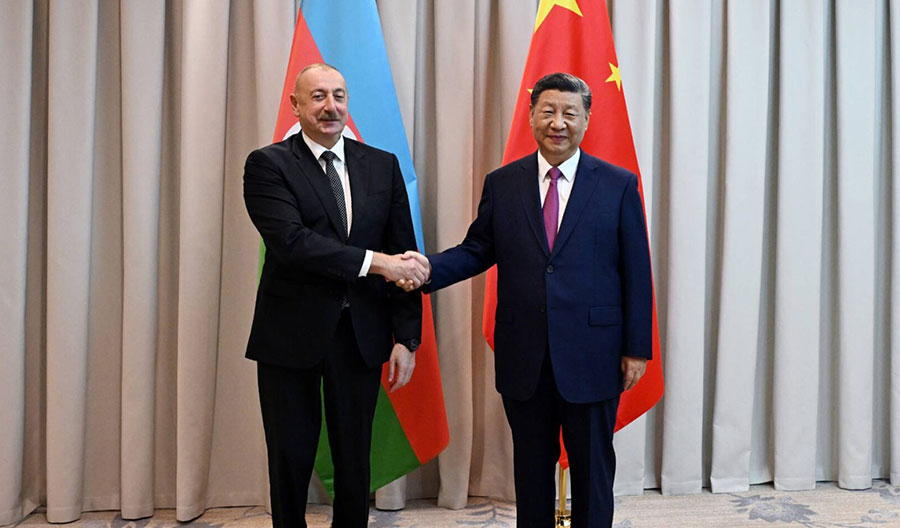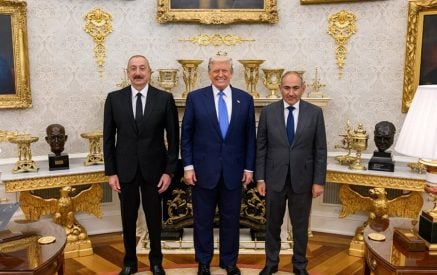by Yeghia Tashjian
On August 29, 2023, in my article “What does the expansion of BRICS mean for the South Caucasus?” I argued that Iran’s accession to BRICS and the integration of the region’s infrastructure into the International North-South Transport Corridor (INSTC) would similarly increase pressure on Armenia and Azerbaijan to join the bloc. The post-2020 regional status quo and the war in Ukraine have opened the path for new Eurasian actors such as India and China to exert their influence on the South Caucasus. Azerbaijan is the main beneficiary of this development. Positioned strategically along the North-South and East-West transport corridors, Baku has capitalized on its position to become a pivotal transportation and logistics hub in Eurasia. This has caught the attention of China amid the geopolitical shifts that took place in the South Caucasus in light of the second Artsakh (Nagorno-Karabakh) and Ukraine wars.
Hence, it is not surprising that Azerbaijan has begun to proactively engage with Eurasian powers and their institutions. It is early to assess whether this is a pivot or a continuation of its traditional balanced foreign policy. However, Baku, for now, is successfully consolidating its position at the expense of regionally isolated Armenia. This article will address this foreign policy evolution by highlighting key arguments from Azerbaijani experts and analyzing the impact of this engagement on the South Caucasus.
Engaging with China
Read also
On July 3, 2024, Azerbaijan and China adopted a joint declaration on “establishing a strategic partnership.” During a meeting between Azerbaijani President Ilham Aliyev and Chinese President Xi Jinping ahead of the Shanghai Cooperation Organization (SCO) meeting in Astana, the leaders upgraded their countries’ bilateral relations to a “strategic partnership” and pledged the advancement of the construction of the Middle Corridor to strengthen connectivity and “ensure the healthy and stable operation of China-Europe freight trains.”
The agreement can be seen as a diplomatic success for Baku. According to the signed document, both sides have agreed “to expand cooperation in the political, economic and cultural spheres, strengthen interactions in international affairs, jointly protect the common interests of two countries, as well as jointly promote the cause of regional and global peace, stability and development.” The document mentions that Beijing hails Baku’s ambitions to strengthen ties with the SCO, and “China welcomes Azerbaijan’s participation in BRICS cooperation.” It also states that both countries perceive each other as “reliable partners.”
Importantly for China, the document says that Baku supports the “One China Principle” and considers Taiwan an inseparable part of China’s territory. Importantly for Azerbaijan, the document says that China supports the peace agenda proposed by Azerbaijan in the South Caucasus and “considers counterproductive geopolitical intrigues aimed at maintaining confrontation.” This phrase is a clear indication that China is not in favor of European or U.S. diplomatic involvement in the region. Moreover, both sides also pledged to fight against terrorism, separatism and extremism. This was a key diplomatic milestone for both countries, as Baku guaranteed China’s support for “resolving the Nagorno-Karabakh issue,” and Beijing guaranteed Baku’s silence when addressing the Xinjiang issue.
With regard to the economic angle, the document indicates that the parties aim to strengthen their transit and transport interaction. China expressed its readiness to actively participate in the construction and use of the Trans-Caspian International Transport Corridor (also known as the “Middle Corridor”). It also says that China will work closely with Azerbaijan and other countries along the route to “jointly facilitate the uninterrupted operation and accelerated development of the southern corridor for China-Europe freight trains and in the opposite direction.” In this context, it is not surprising that Azerbaijan is promoting the “Zangezur Corridor” narrative as a potential route for the Middle Corridor, seeking to get China’s backing and exert additional pressure on Armenia.
In an article written by Muhammad Mammadov and Shahim Afandiyeva titled “China Moment in Azerbaijan’s Foreign Policy?” published at the Baku-based Topchubashov Center, the authors argue that “ensuing Western support to Armenia in economic and political realms caused friction in Azerbaijan’s ties with the West.” According to the authors, this factor has weakened Azerbaijan’s ties with one of the pillars of its traditional balanced foreign policy. However, this was a calculated step by Baku given the geopolitical reality on the ground, as China signed a similar agreement with Georgia in July 2023. The authors argue that Beijing aims to improve its foothold in the South Caucasus amid Russia’s shifting attention from the region due to the war in Ukraine. Moreover, Mammadov and Afandiyeva argue that there is a certain “pivot” by Baku towards China, and this policy deepened after the second Artsakh War, as Baku aims for a stronger partnership in geopolitical and geo-economic spheres with China. Meanwhile, Baku also aims to secure Chinese support for the new regional status quo forged after the 2020 war, fearing attempts by extra-regional or regional powers to shift the balance of power. It is worth mentioning that after the 2020 war, Baku invited Chinese companies to invest in the newly captured territories. From Baku’s perspective, deepening relations with China against the backdrop of an emerging global and regional multipolar order may serve its interests to prevent the hegemony of a single power (either Russia or the West) in the South Caucasus. Within this context, Baku also applied to change its status in the SCO from a dialogue partner to an observer country (Armenia, Bangladesh, Cambodia and Sri Lanka also took similar steps).
However, Farid Shafiyev, chairman of the Center of Analysis of International Relations, does not support the argument that Baku is completely pivoting to the East, though he does agree that there is a certain shift. He posted on X that this current policy is a continuation of Azerbaijan’s traditional “balanced foreign policy,” arguing: “After Azerbaijan’s participation and desire to upgrade its status in the Shanghai Cooperation Organization, signing a strategic partnership agreement with China, and interest in BRICS, some experts rushed to say that Azerbaijan is abandoning its traditional balanced foreign policy. Despite some degree of pivots towards the East (which was partly caused by the recent attitude from the West), Azerbaijan’s President’s participation at the summit of the European Economic Community meetings, and comments there manifested that overall, the country continues balanced foreign policy.”
Hence, many Azerbaijani experts do believe that there is a certain shift in the country’s foreign policy, but this shift cannot be classified as a “pivot.” It is largely a reaction to Western involvement in the region allegedly “in favor of Armenia,” as stated by Farhad Mamedov, director of the South Caucasus Research Center in Baku.
Why does Baku want to join BRICS?
On July 11, 2024, at the BRICS parliamentary forum in St. Petersburg, Azerbaijani parliament speaker Sahibe Gafarova announced that Azerbaijan aspires to become a full member of BRICS. This move was backed by Beijing, as mentioned in the joint declaration agreement.
Mahr Qasimov, the head of Azerbaijan’s Foreign Ministry’s Analysis and Strategic Research Department, during an event titled “Azerbaijan and BRICS: Opportunities and Prospect” in April 2024, said that Baku actively cooperates with China and other BRICS members. He noted that BRICS is attractive to Baku due to the large labor markets and natural resources possessed by the member states and their membership in major organizations such as the UNSC, G20 and SCO. Qasimov added, “Issues such as territorial integrity and the inviolability of sovereignty are specified emphasized in BRICS documents. The three main directions within BRICS are political and security, financial and economic, and cultural and people-to-people relations.”
In an interview with the Turan agency, Azerbaijani MP Tahir Mirkisili said that in 2023, 20% of Azerbaijan’s trade turnover was with BRICS members, and Russia and China are its third and fourth largest trade partners. The MP emphasized that Baku can play a significant transit role between China and Europe through the “East-West” and Russia-Iran-India “North-South” corridors. He added that Baku aims to continue and deepen relations with the EU, BRICS and the SCO, as these are steps taken in line with Azerbaijan’s economic policy amid current global realities. The Azerbaijani MP added that, unlike other organizations, BRICS membership does not come with restrictions regarding states’ national interests and territorial integrity, and Baku can continue balancing the West and East.
However, there is no clear date when Azerbaijan intends to join the bloc. Economist Natig Jafari hinted that Azerbaijan may join the bloc with Turkey, as Ankara has also shown significant interest in joining the bloc. Ankara and Baku’s accession may encourage the Central Asian countries to join as well. Hence, BRICS would swallow most of the SCO members, turning the block into a Eurasian game changer.
Reflections
China’s economic involvement in Central Asia, amid Russia’s weakening influence, serves Baku’s interests, as it hopes to reap the benefits of Chinese investments in the Middle Corridor connecting China to Europe through the Caspian region. The limits of China’s economic and political involvement in the South Caucasus and whether Beijing aims to expand at the expense of Russia and Turkey are still open questions. These developments will depend on the outcome of the war in Ukraine and the process of conflict resolution as well as the redrawing of the sphere of influence in the region. Hence, it is early to argue that Azerbaijan is pivoting towards China.
China’s increasing influence in the region has also been welcomed by Russia and Iran, as they see Beijing as a crucial actor in neutralizing Western influence in the region. For now, Baku aims to deepen its partnership ties with China and engage with Eurasian institutions such as the SCO and BRICS in order to balance the influence of the West and Russia, enhance regional multipolarity and create new spaces and options for political and economic maneuvers.
Several conclusions can be drawn from this analysis that may impact the South Caucasus. The possibility of Azerbaijan joining BRICS and upgrading its status in the SCO would increase its economic and political engagement with China, Russia and other Eurasian actors. Moreover, China’s growing interest in the Middle Corridor as the only land route towards Europe may push Azerbaijan to increase its pressure on Armenia on the issue of the “Zangezur Corridor.” This pressure would also be backed by China, which aims to have an alternative and shorter route through the South Caucasus given political uncertainty in the region. This may also enhance Russian, Chinese and Turkish cooperation in the region by connecting the Middle Corridor to the International North-South Transport Corridor in southern Armenia, thus neutralizing Iran’s fears related to Syunik. This factor would significantly minimize Western influence in the region.
Finally, Azerbaijan’s flexible foreign policy between the East and the West is increasing the country’s geo-economic significance for regional and global powers. Irrespective of Baku’s human rights records and ethnic cleansing of Armenians in Artsakh, the West still values Azerbaijan due to its energy resources and its East-West transit role. This is why the “dark cloud” passing between some European countries and Azerbaijan is only temporary. For the East, Baku possesses the same significance, mainly related to economic corridors. This flexibility will allow Azerbaijan to lobby for regional and international support for its plans related to the “Zangezur Corridor.” Such positions are already being raised in the U.S. on an official level, including arguments that opening trade routes between Yerevan and Baku could facilitate trade between Central Asia and the Mediterranean. Still, the main dispute between Russia and the West is over the status of these routes passing via southern Armenia, as the U.S. is against Russia controlling these strategic routes.
In the long run, and amid growing pressure from Eurasian powers, the regional balance of power may completely slip from the hands of Western actors, and Azerbaijan may find itself in a difficult position balancing between a weakened or isolated West and multiple Eurasian powers. The interests of India, China, Russia and Iran diverge in different areas, and Azerbaijan may find itself navigating their disputes.























































